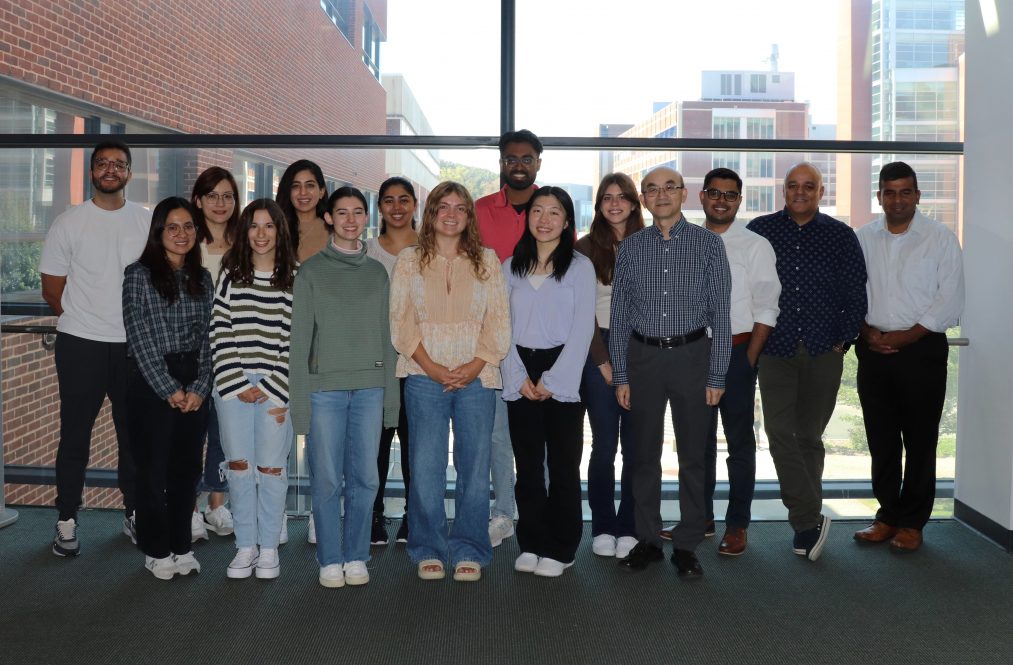Pharmacology and Toxicology professors Xiaobo Zhong, José Manautou, Theodore Rasmussen, and Raman Bahal and their research students have spent the last year working collaboratively to investigate new and more effective treatment options of antisense oligonucleotide (ASO) and small interfering RNA (siRNA) drugs for systemic diseases of liver origin in a review article published in Pharmacological Reviews. Their work was inspired by recent graduate May Zhang’s thesis: The Growth of siRNA-based Therapeutics: Updated Clinical Studies (Zhang et al., 2021, PMID:33513339). Her work inspired Zhong and other SoP faculty to task their current students to explore the effects of nucleic acid therapeutics on the liver, which is often where many diseases begin to form.
The students, made up of School of Pharmacy pre-professional, professional, Ph.D., and CLAS students, worked within the larger group, in subgroups, and independently. In the larger group the students drafted an introduction and conclusion, were taught an overview of the topic, and exchanged feedback. The groups were divided up into subgroups to tackle two main topics: systemic diseases of liver origin and the corresponding treatments of nucleic acid therapeutics. Independently, the students focused on writing about one specific disease and associated nucleic acid drugs as their contribution to the paper, covering eight rare and common diseases and 15 drugs. Once the paper was completed the students revered their experience, saying it was an exceptional exercise in applying what they learned in the classroom to a real-world situation.
“I have been part of Dr. Zhong’s lab for a year now and being in this Lab helped me connect what I learned in class to the real world of pharmacy,” says Pharm.D. student, Alicia Zongxun Wang. “I learned not only about siRNA drugs from writing this paper, but I also learned how to produce a scholarly article and analyze drug trial data, which bridged my learning from various classes in school to the clinical world.”
Many students felt the experience not only made them better writers but improved their experience working in groups and as well as independently. “Working on this project with Dr. Zhong and the other faculty was my first research experience, and it was so valuable,” says Pharm.D. student, Jordyn Belcourt. “Most people think of research as doing experiments in a lab, but that’s not the only way. In this project, we gathered existing information and came to new conclusions using clinical trial data. It was a new skill I had to learn. I was appreciative that I got to start working with a small team and then moved onto an independent section. It allowed me to gain confidence over time. This was a huge collaborative effort that wouldn’t have been possible without every member of the team putting in their best effort.”
Zhong expressed pride in his students and gratitude for all their hard work this past year. This article cited an almost unheard of 300 sources and has laid the foundation for his lab to investigate the possible usage of RNA-based therapies as treatment for rare and common diseases.
“This comprehensive review explores groundbreaking approaches to treat systemic diseases of liver origin through nucleic acid therapeutics,” says Zhong. “We have delved deep into the potential of these innovative therapeutics and their impact on liver-originated diseases. Whether you are a researcher, clinician, or simply interested in the future of liver disease treatment, this paper is a valuable resource. I encourage people to check out the paper and share it with colleagues and throughout their network. This kind of support can help spread awareness and drive further research in this crucial area.”
Student Authors: Aarush Kolli (Pre-Pharmacy), Anagha Gogate (P2), Jordyn Belcourt (P1), Milan Shah (P3), Alicia Zongxun Wang (P1), Alexis Frankel (P1), Sherouk Tawfik (PHARM Ph.D. candidate), and Jing Jin (PHARM Ph.D. candidate), Holly Kolmel, (CLAS Pre-Med), Matthew Chalon (CLAS Biomedical Sciences), and Prajith Stephen (CLAS PNB)
Read the journal article here.



